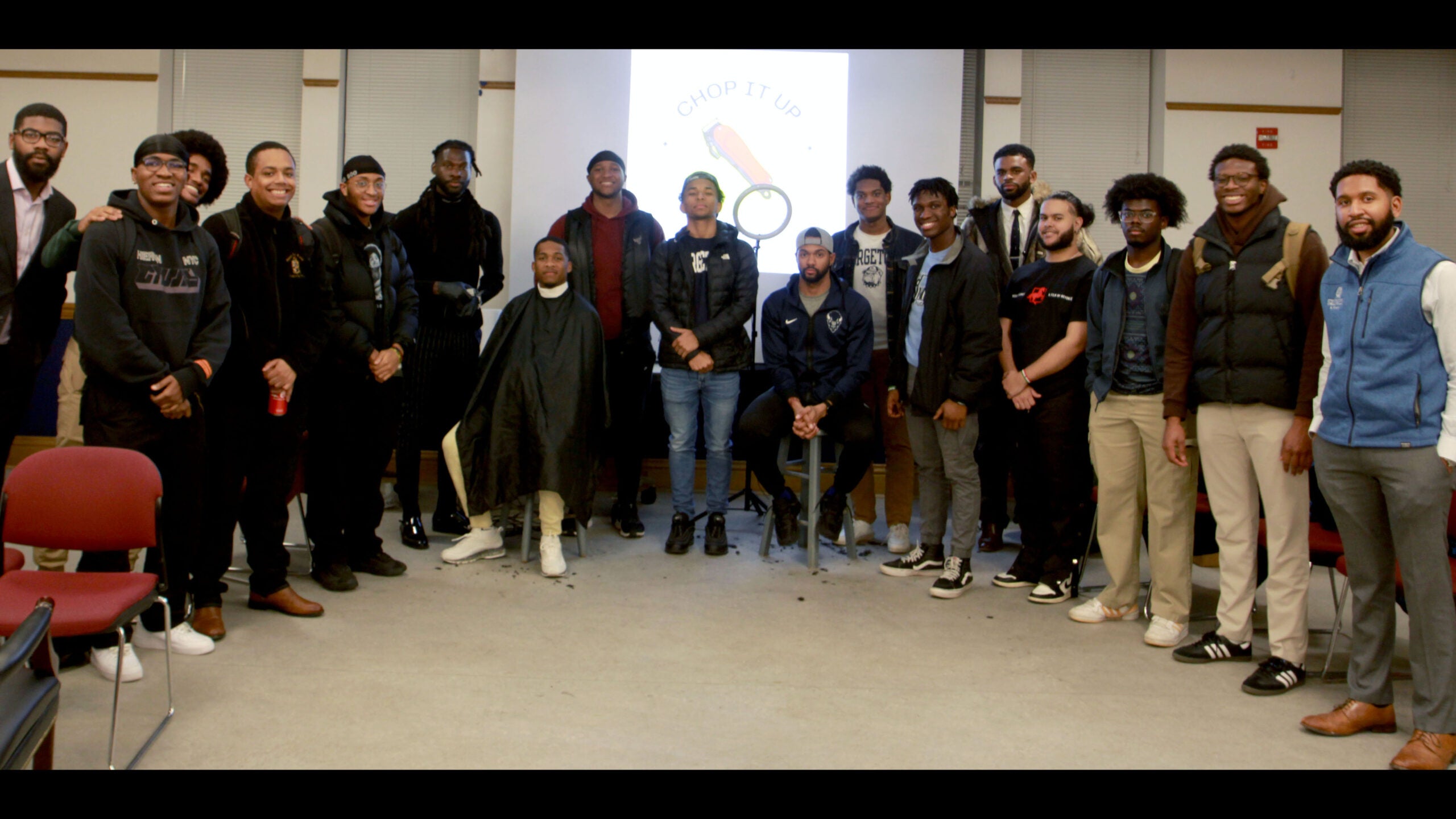The Ministry of a Good Haircut
Black Students Find Camaraderie and Quality Cuts with Chop It Up
By Jennon Bell Hoffman
For incoming first-year students, navigating a new courseload and campus is overwhelming enough. Finding their way around a big, bustling metropolis like Washington D.C. is also daunting, especially when you’re just trying to get a good haircut. For men and women of color, finding services and spaces in a predominantly white institution (PWI) like Georgetown can add an extra barrier to feeling welcome and settled.
Protestant Christian Chaplain Rev. TauVaughn Toney, affectionately known as Rev T., noticed that the same questions were coming up among the Black male students—mostly they wanted to know about Rev. T’s barbershop. Feeling a lack of good quality shops on campus, the students were taking Ubers across town in hopes of finding a decent haircut, often spending more than the service. Working with the Black Interfaith Fellowship and the Cookout retreat team, Rev. T put his community organizing skills to work and last fall, launched an event called Chop It Up.
“We said, ‘Let’s see if we can bring some barbers to campus and gather students together and get your hair cut,” says Rev. T. “It’s grown into this community of students who have built friendships and gotten to know each other over this last year, and it’s been really beautiful to see, all through getting the haircut and having conversations.” The barbershop has been a cultural hub for Black men throughout history, offering both a place for personal grooming and a community touchstone. Made famous in movies such as Barbershop and Coming to America, the Black barbershop is about more than a fresh fade—it’s a space for men to join together, openly talk about any and all topics, clean up their style, and be together in a nonjudgmental, friendly space.
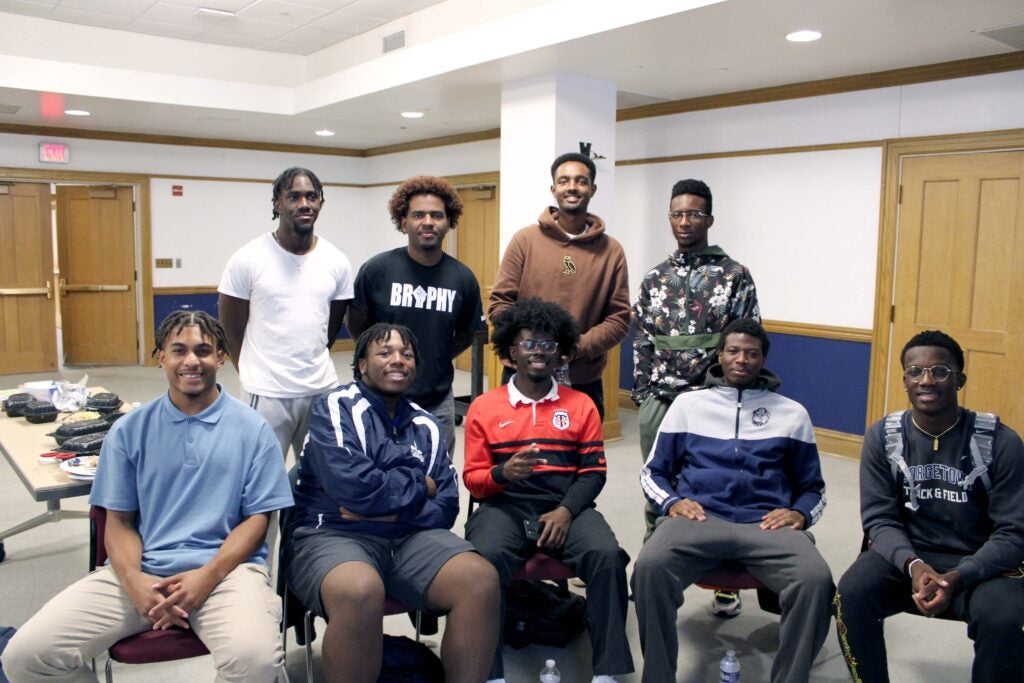
Students at the first gathering of Chop It Up, October 2023.
In the spirit of making space and building community, Chop It Up successfully launched its first event in the Fall of 2023 with 15-20 students in attendance. The combination of good food, free haircuts, music, and easy-going conversation proved to be a huge draw for Black male students at Georgetown. Bolstered by the strong word-of-mouth campaign, Chop It Up grew to around 40 attendees for the Spring 2024 event, and is in the planning stages for even more attendees for the next events later this fall.
“That’s been one of my favorite, most heartening things to see—how these men and this group have grown. They all know each other, have built this tight-knit group, [and] that’s been really cool,” says Rev. T. “Going forward, you want to keep it intimate and to continue building that community. But also, I think it’s going to be inevitable that it continues to grow as the word spreads.”
Like most attendees, sophomore BJ Little (C‘27) heard about Chop It Up through the grapevine, from a friend who had attended the Cookout retreat, which is centered around Black men and women of Georgetown, and thought the timing was perfect.
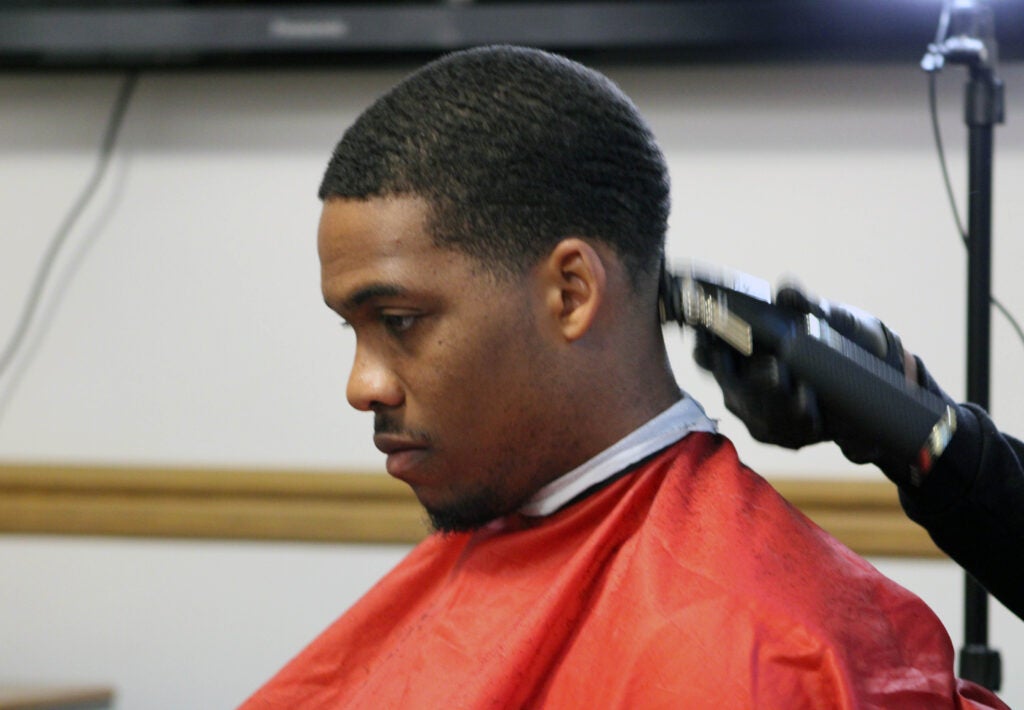
BJ Little (C‘27) gets a fresh haircut.
“Thankfully, I needed a haircut badly, so it came in clutch. It was right before Thanksgiving break, so I went home looking fresh,” says BJ. After his first session with Chop It Up, he knew he wanted to be involved with growing the event.
“[I] loved the work that they were doing, bringing Black students together, cultivating that sense of community, while we’re leaving looking like really good, really handsome men. You also feel like you’ve been heard,” says BJ. “Georgetown is a PWI, so sometimes you feel like you can’t really say certain things in certain spaces. So it was very important to us that we did have that space where we could curate a safe environment based on similarity and likeness.”
Mike Georges (C‘26), a junior who is also part of the planning group for future Chop It Up sessions, appreciates the kind of personal, wide-ranging conversations that Chop It Up sparks.
“It’s a good vibe: we cut our hair, we talk about topics that affect minority men, such as, what’s our favorite genre of music to something like, how will we, as Black men, raise our own kids,” says Mike. “It’s an array of topics, and a lot of the topics were just free flowing. There’s no pressure.”
One feature of Chop It Up that attendees appreciate is the Hot Seat, where a participant will sit in the center and start the conversation with a specific topic that he wants to discuss. What follows can be fun and silly—such as debating the over- or underratedness of Beyonce—to serious and introspective, like discussing their experiences as Black men in the world. Above all else, the conversations always come from a place of respect and community, passing wisdom, support, advice, and camaraderie amongst themselves.
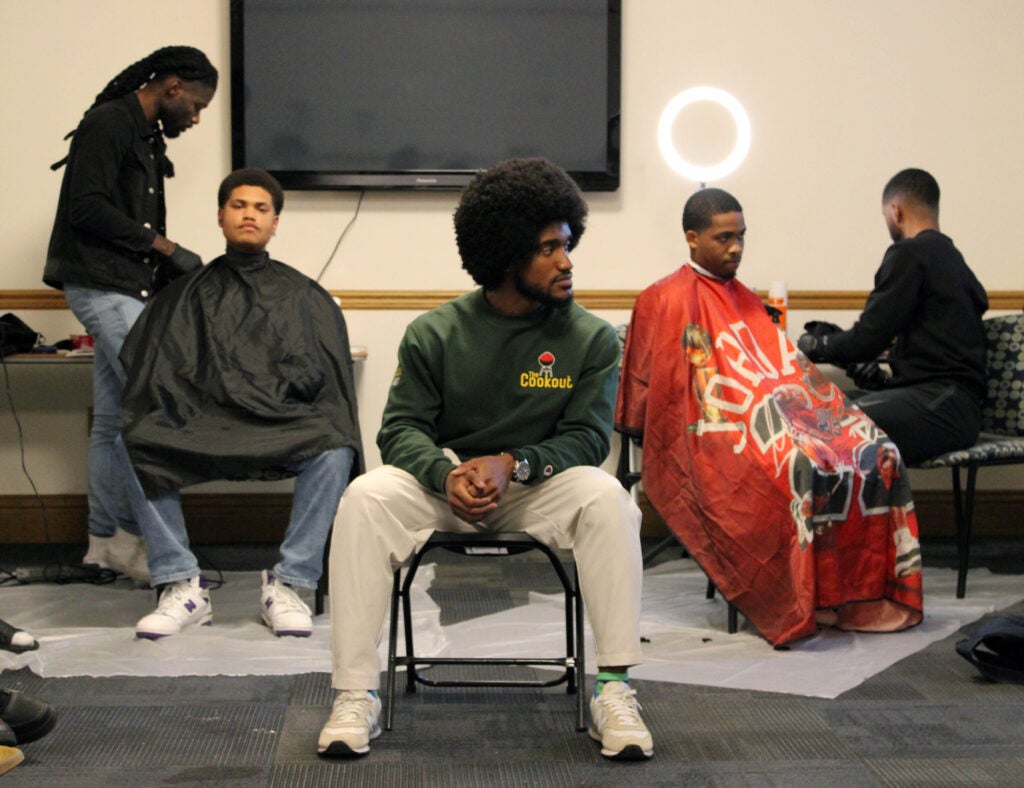
Akil Cole (C’24) one of the original organizers for Chop It Up sits in the Hot Seat (pictured center).
“Especially post-Covid, I think it’s important to build back up certain communities. Chop It Up it’s really a good space for minorities of different classes and backgrounds to come together—for example, a senior giving advice to a freshman on their own experiences because they went through it,” says Mike.
“It betters me to understand other people, but also strengthen our relationships as friends and as individuals, and I think that’s a very important part,” says sophomore Bakary Kone (C‘27).
Considering how welcome and well-attended the past events have been, it’s surprising to find zero online presence or promotion for Chop It Up. While Rev T says it’s not by deliberate design because the underground network has been working so well, the planning team is confident that if they plan it, students will come.
“Because the word-of-mouth is so organic, and because our community is so small, you’re going to find out either way, from a friend who knows a friend who knows a friend that Chop It Up is happening,” says Bakary. “And I think that’s kind of been our superpower, in a sense. It’s like, if you know, you know, and if you don’t know, then probably, you’ll know soon enough.”
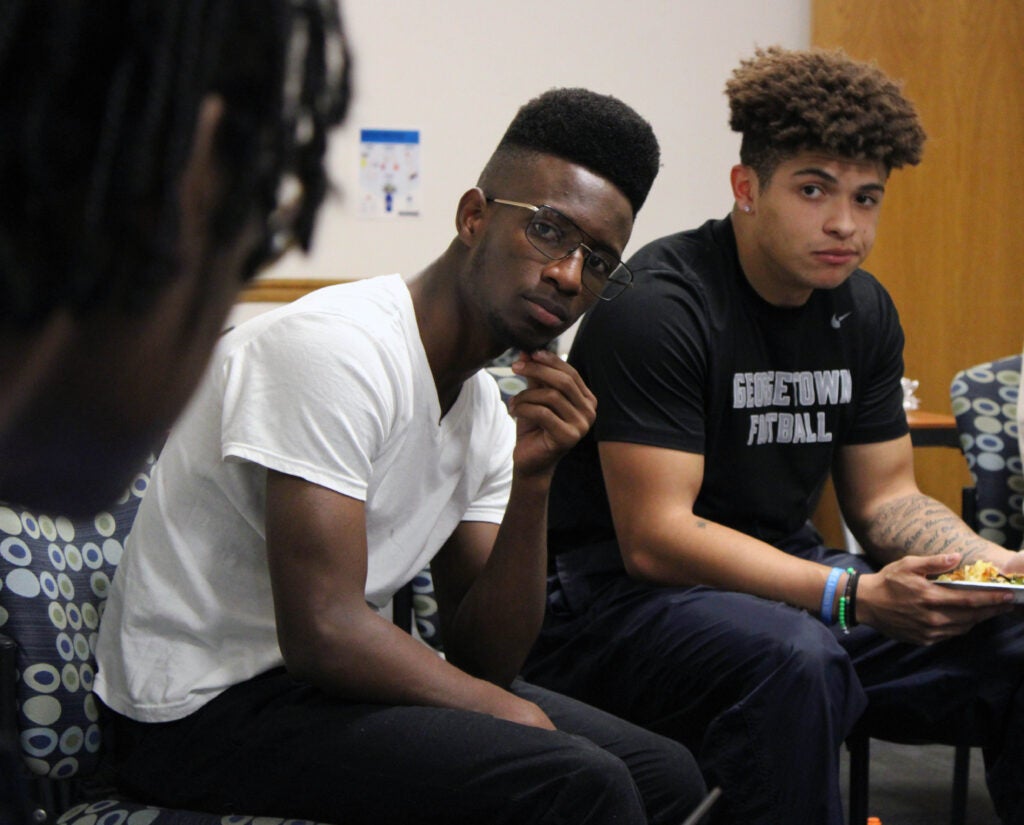
Frederick Mwansa (SFS’26) and Jordan Holmes (C‘27) enjoy food and conversation at Chop It Up.
And once a student finds Chop It Up, the general consensus is that they’ll be happy to be folded into an evolving, inclusive, safe space for Black men on campus. Food is catered, chairs are in a communal circle, with the barbers wielding their tools up front, open, free-flowing music and dialogue set the vibe. Students are encouraged to pop in and stay as long as they’d like, participate however they want, and share in the community. Staff and faculty are also invited to drop in, which Mike says helps build the perspectives about life as a Black man at Georgetown and beyond.
“One of my own teachers, Professor Elijah, came to Chop It Up and talked to us about his experience as a Black teacher at Georgetown, what he likes in the Black community at Georgetown, what he wants to see in the Black community at Georgetown. Chop It Up is a great space for that kind of connection.”
The immediate popularity of Chop It Up isn’t surprising—what college student wouldn’t love a free haircut and food?—but what Rev. T is excited by is the stronger connections to the Georgetown mission that will serve the students beyond their days on the Hilltop.
“The students come here with the tools and Georgetown and Campus Ministry provide them a space to own those tools and to prepare those tools for the world ahead to continue to build communities,” says Rev. T. “To put it in terms of Scripture, the great work that was already put within them to do. This is a space for them to do that.”
Chop It Up organizers would like to thank Lawrence Wyman and Kameron “Kash” Davis for their commitment to providing quality haircuts and timeless wisdom and encouragement to students.
Rev. TauVaughn Toney is a Protestant Christian Chaplain.
Mike Georges is a junior studying Government and Black Studies.
BJ Little is a sophomore studying government.
Bakary Kone is a sophomore studying economics.
Jennon Bell Hoffmann is a freelance writer and editor living in Chicago.
